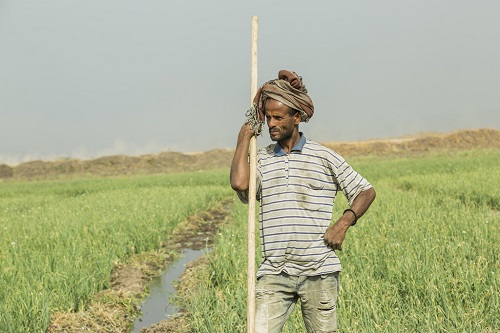IWMI photo
By
Alem Hailu G/Kristos
Following the attention accorded to Ethiopia’s agriculture sector, product and productivity are displaying an upward spiral by the year. In consonance of this trend farmers’ lifestyle is also showcasing a turn for the better.
The sector’s contribution for the country’s economy is still immense. Even if out of the Gross Domestic Product, the contribution of the industry sector in general and the service wing in particular is mounting, the agriculture sector is covering 40 percent of the pie.
Yet the answer to the question “Is the agriculture sector striding keeping the required momentum?” will be “No!” The problem correlates with the sector’s tardiness in getting off the ground embracing modern ways.
The country still relies on a farming system that heavily leans on animal-driven ploughs and outmoded traditions.
Though investors are invited to come aboard, the registered result could not come anywhere near the much-needed change. To verify that the agriculture sector stops short of discharging the role to the level expected from it, it suffices to see the USD that flows out in millions to import wheat. Ironically, it is leaving fallow its abundant land salubrious for harvesting wheat the country outlays badly-needed foreign exchange.
When it comes to modernization the agriculture sector lags behind. This has become a source of concern for the agro-industrial parks being put in place. Obviously, the parks utilize agricultural yields as input. If the inputs are not to the required volume and quality, the output from the parks will be far from satisfactory. This tells on the exigency of modernizing the agriculture sector.
Dr.Abiy Ahmed has been repetitively underlining the urgency of modernizing the agriculture sector. He capitalizes on the significance of irrigation farming. As to him, utilizing the country’s water resources it is possible to change arid areas into paradises. In the coming fiscal years irrigation will be accorded added attention.
Indeed irrigation plays a key role in bumping up agricultural yields. In the efforts so far underway to this effect it is possible to double and triple agricultural products on smallholder farmers. But this irrigation development is confined to vegetables and a few crops. The agricultural yield the economy demands is high. Hence, as much task as the required task is called for. Towards this end, irrigation has great potential.
In Ethiopia there is 3.7 million hectares to 4.3 million hectares of irrigable land. Out of this, it is only 7 to 10 percent of land that is being developed. Yet, the country has surface and underground water reserves that could develop the irrigable land. Therefore, utilizing this potential is decisive. The government has prepared a roadmap that allows it to effectively utilize the land unleashing this potential. Accordingly, bottlenecks that could pose a challenge like human resources, finance, technology and structural set up are identified. The roadmap spares the country from audaciously jumpstarting full scale irrigation based on experiences gained from small-scale irrigation works. Based on the roadmap, focusing on tackling tasks in the pipeline is decisive. What is required now is just kickstarting the task. The government has clearly indicated the importance of pursuing irrigation on its roadmap. Conviction is expected from the government to translate the roadmap into action. Of course, the task is a gigantic one.
The determination showcased in bringing into play industrial parks, power-generating plants and sugar-factories, among others, must be repeated in the spheres of irrigation development. As to experts in the field if resources outlaid on irrigation development are properly utilized the effort will be attended by handsome returns. Taking into account the significance of the task, there is a need to work hard placing focus on large scale irrigation. As it is known the population of Ethiopia is snowballing, the industry sector is anticipated to take over the driver’s seat of the economy and agricultural yields are expected to feed the industry.
Given the tangible situation in the country, it is agriculture that could garner the hard currency much-needed for the developmental thrust of the country. All these facts presuppose the modernization of agriculture. One of the ways to this effect is doubling and tripling agricultural yields using irrigation as a springboard.
It is by modernizing agriculture the country could ensure properly feeding citizens coming up with the right value and quality of industrial inputs and augmenting foreign currency badly needed to spur the nation’s development. Commitment on the government’s side to throw its full weight towards irrigation development, which had been put on the backburner for long, is crucial.
Alem Hailu G/Kristos
A published poet, novelist, editor, translator of masterpieces, literary critic, playwright and journalist from Ethiopia. M.A holder in literature, Addis Ababa University.
Looking for a traditional publisher of a collection of poems. My novel: ‘Hope from the debris of hopelessness’.



No Comments Yet!
You can be first to comment this post!